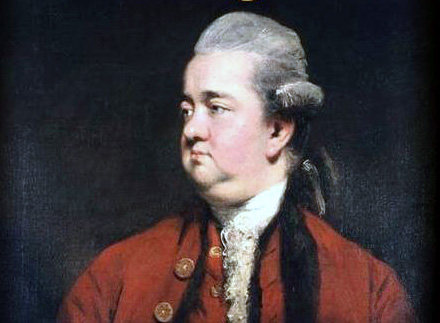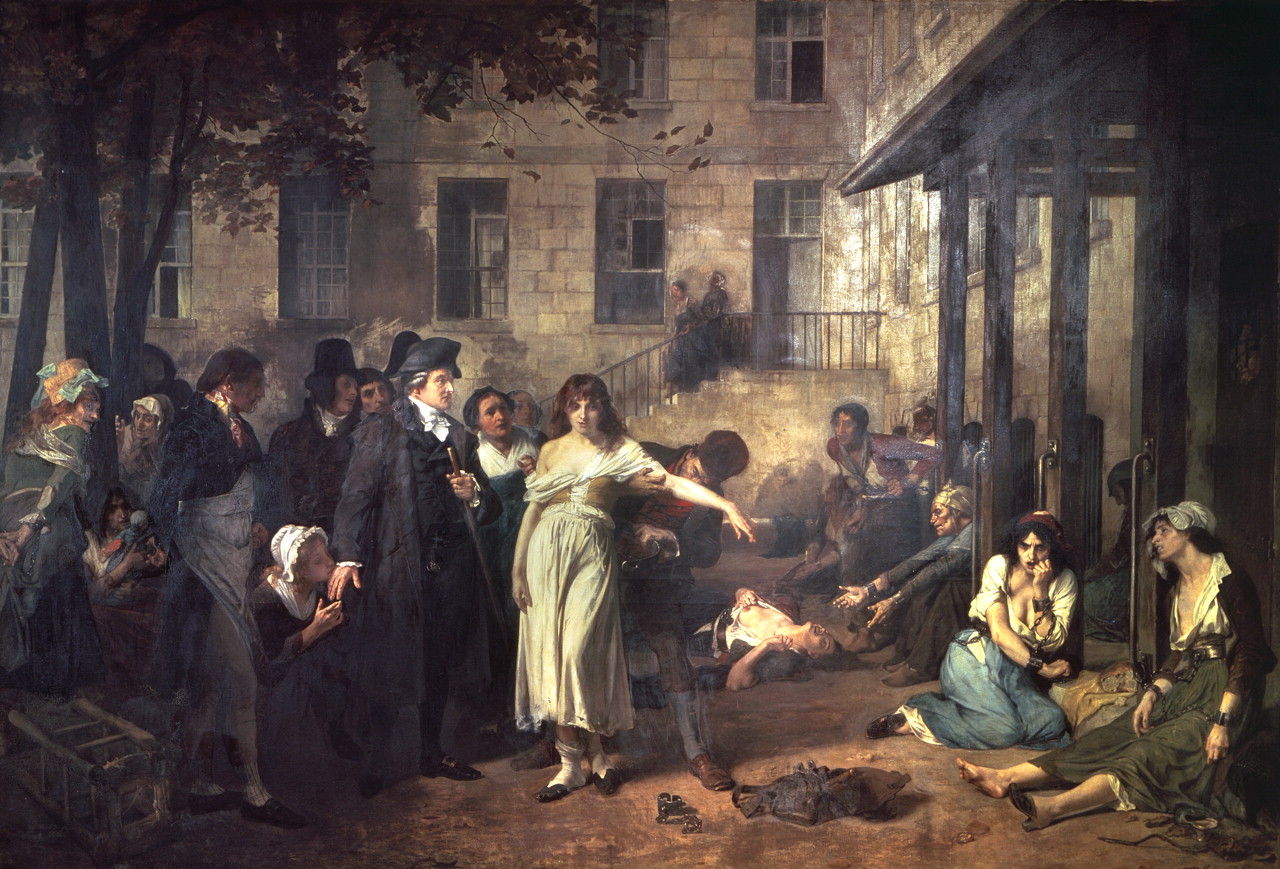
The History of the Decline and Fall
of the Roman Empire
Chapter XXII
After a painful conflict, Julian was compelled to acknowledge, that obedience was the virtue of the most eminent subject, and that the sovereign alone was entitled to judge of the public welfare.
He issued the necessary orders for carrying into execution the commands of Constantius; a part of the troops began their march for the Alps; and the detachments from the several garrisons moved towards their respective places of assembly. They advanced with difficulty through the trembling and affrighted crowds of provincials, who attempted to excite their pity by silent despair, or loud lamentations, while the wives of the soldiers, holding their infants in their arms, accused the desertion of their husbands, in the mixed language of grief, of tenderness, and of indignation.
This scene of general distress afflicted the humanity of the Cæsar; he granted a sufficient number of post-wagons to transport the wives and families of the soldiers, endeavored to alleviate the hardships which he was constrained to inflict, and increased, by the most laudable arts, his own popularity, and the discontent of the exiled troops.
The grief of an armed multitude is soon converted into rage; their licentious murmurs, which every hour were communicated from tent to tent with more boldness and effect, prepared their minds for the most daring acts of sedition; and by the connivance of their tribunes, a seasonable libel was secretly dispersed, which painted in lively colors the disgrace of the Cæsar, the oppression of the Gallic army, and the feeble vices of the tyrant of Asia. The servants of Constantius were astonished and alarmed by the progress of this dangerous spirit. They pressed the Cæsar to hasten the departure of the troops; but they imprudently rejected the honest and judicious advice of Julian; who proposed that they should not march through Paris, and suggested the danger and temptation of a last interview.
As soon as the approach of the troops was announced, the Cæsar went out to meet them, and ascended his tribunal, which had been erected in a plain before the gates of the city. After distinguishing the officers and soldiers, who by their rank or merit deserved a peculiar attention, Julian addressed himself in a studied oration to the surrounding multitude: he celebrated their exploits with grateful applause; encouraged them to accept, with alacrity, the honor of serving under the eye of a powerful and liberal monarch; and admonished them, that the commands of Augustus required an instant and cheerful obedience.
The soldiers, who were apprehensive of offending their general by an indecent clamor, or of belying their sentiments by false and venal acclamations, maintained an obstinate silence; and after a short pause, were dismissed to their quarters. The principal officers were entertained by the Cæsar, who professed, in the warmest language of friendship, his desire and his inability to reward, according to their deserts, the brave companions of his victories. They retired from the feast, full of grief and perplexity; and lamented the hardship of their fate, which tore them from their beloved general and their native country.
The only expedient which could prevent their separation was boldly agitated and approved the popular resentment was insensibly moulded into a regular conspiracy; their just reasons of complaint were heightened by passion, and their passions were inflamed by wine; as, on the eve of their departure, the troops were indulged in licentious festivity. At the hour of midnight, the impetuous multitude, with swords, and bows, and torches in their hands, rushed into the suburbs; encompassed the palace; and, careless of future dangers, pronounced the fatal and irrevocable words, Julian Augustus!
The prince, whose anxious suspense was interrupted by their disorderly acclamations, secured the doors against their intrusion; and as long as it was in his power, secluded his person and dignity from the accidents of a nocturnal tumult. At the dawn of day, the soldiers, whose zeal was irritated by opposition, forcibly entered the palace, seized, with respectful violence, the object of their choice, guarded Julian with drawn swords through the streets of Paris, placed him on the tribunal, and with repeated shouts saluted him as their emperor.
Prudence, as well as loyalty, inculcated the propriety of resisting their treasonable designs; and of preparing, for his oppressed virtue, the excuse of violence. Addressing himself by turns to the multitude and to individuals, he sometimes implored their mercy, and sometimes expressed his indignation; conjured them not to sully the fame of their immortal victories; and ventured to promise, that if they would immediately return to their allegiance, he would undertake to obtain from the emperor not only a free and gracious pardon, but even the revocation of the orders which had excited their resentment.
But the soldiers, who were conscious of their guilt, chose rather to depend on the gratitude of Julian, than on the clemency of the emperor. Their zeal was insensibly turned into impatience, and their impatience into rage. The inflexible Cæsar sustained, till the third hour of the day, their prayers, their reproaches, and their menaces; nor did he yield, till he had been repeatedly assured, that if he wished to live, he must consent to reign. He was exalted on a shield in the presence, and amidst the unanimous acclamations, of the troops; a rich military collar, which was offered by chance, supplied the want of a diadem; the ceremony was concluded by the promise of a moderate donative; and the new emperor, overwhelmed with real or affected grief retired into the most secret recesses of his apartment.
The grief of Julian could proceed only from his innocence; out his innocence must appear extremely doubtful in the eyes of those who have learned to suspect the motives and the professions of princes. His lively and active mind was susceptible of the various impressions of hope and fear, of gratitude and revenge, of duty and of ambition, of the love of fame, and of the fear of reproach. But it is impossible for us to calculate the respective weight and operation of these sentiments; or to ascertain the principles of action which might escape the observation, while they guided, or rather impelled, the steps of Julian himself.
The discontent of the troops was produced by the malice of his enemies; their tumult was the natural effect of interest and of passion; and if Julian had tried to conceal a deep design under the appearances of chance, he must have employed the most consummate artifice without necessity, and probably without success. He solemnly declares, in the presence of Jupiter, of the Sun, of Mars, of Minerva, and of all the other deities, that till the close of the evening which preceded his elevation, he was utterly ignorant of the designs of the soldiers; and it may seem ungenerous to distrust the honor of a hero and the truth of a philosopher.
Yet the superstitious confidence that Constantius was the enemy, and that he himself was the favorite, of the gods, might prompt him to desire, to solicit, and even to hasten the auspicious moment of his reign, which was predestined to restore the ancient religion of mankind. When Julian had received the intelligence of the conspiracy, he resigned himself to a short slumber; and afterwards related to his friends that he had seen the genius of the empire waiting with some impatience at his door, pressing for admittance, and reproaching his want of spirit and ambition.
Astonished and perplexed, he addressed his prayers to the great Jupiter, who immediately signified, by a clear and manifest omen, that he should submit to the will of heaven and of the army. The conduct which disclaims the ordinary maxims of reason, excites our suspicion and eludes our inquiry. Whenever the spirit of fanaticism, at once so credulous and so crafty, has insinuated itself into a noble mind, it insensibly corrodes the vital principles of virtue and veracity.
To moderate the zeal of his party, to protect the persons of his enemies, to defeat and to despise the secret enterprises which were formed against his life and dignity, were the cares which employed the first days of the reign of the new emperor. Although he was firmly resolved to maintain the station which he had assumed, he was still desirous of saving his country from the calamities of civil war, of declining a contest with the superior forces of Constantius, and of preserving his own character from the reproach of perfidy and ingratitude.
Adorned with the ensigns of military and imperial pomp, Julian showed himself in the field of Mars to the soldiers, who glowed with ardent enthusiasm in the cause of their pupil, their leader, and their friend. He recapitulated their victories, lamented their sufferings, applauded their resolution, animated their hopes, and checked their impetuosity; nor did he dismiss the assembly, till he had obtained a solemn promise from the troops, that if the emperor of the East would subscribe an equitable treaty, they would renounce any views of conquest, and satisfy themselves with the tranquil possession of the Gallic provinces.
On this foundation he composed, in his own name, and in that of the army, a specious and moderate epistle, which was delivered to Pentadius, his master of the offices, and to his chamberlain Eutherius; two ambassadors whom he appointed to receive the answer, and observe the dispositions of Constantius. This epistle is inscribed with the modest appellation of Cæsar; but Julian solicits in a peremptory, though respectful, manner, the confirmation of the title of Augustus. He acknowledges the irregularity of his own election, while he justifies, in some measure, the resentment and violence of the troops which had extorted his reluctant consent. He allows the supremacy of his brother Constantius; and engages to send him an annual present of Spanish horses, to recruit his army with a select number of barbarian youths, and to accept from his choice a Prætorian præfect of approved discretion and fidelity.
But he reserves for himself the nomination of his other civil and military officers, with the troops, the revenue, and the sovereignty of the provinces beyond the Alps. He admonishes the emperor to consult the dictates of justice; to distrust the arts of those venal flatterers, who subsist only by the discord of princes; and to embrace the offer of a fair and honorable treaty, equally advantageous to the republic and to the house of Constantine.
In this negotiation Julian claimed no more than he already possessed. The delegated authority which he had long exercised over the provinces of Gaul, Spain, and Britain, was still obeyed under a name more independent and august. The soldiers and the people rejoiced in a revolution which was not stained even with the blood of the guilty. Florentius was a fugitive; Lupicinus a prisoner. The persons who were disaffected to the new government were disarmed and secured; and the vacant offices were distributed, according to the recommendation of merit, by a prince who despised the intrigues of the palace, and the clamors of the soldiers.
The negotiations of peace were accompanied and supported by the most vigorous preparations for war. The army, which Julian held in readiness for immediate action, was recruited and augmented by the disorders of the times. The cruel persecutions of the faction of Magnentius had filled Gaul with numerous bands of outlaws and robbers. They cheerfully accepted the offer of a general pardon from a prince whom they could trust, submitted to the restraints of military discipline, and retained only their implacable hatred to the person and government of Constantius.
As soon as the season of the year permitted Julian to take the field, he appeared at the head of his legions; threw a bridge over the Rhine in the neighborhood of Cleves; and prepared to chastise the perfidy of the Attuarii, a tribe of Franks, who presumed that they might ravage, with impunity, the frontiers of a divided empire. The difficulty, as well as glory, of this enterprise, consisted in a laborious march; and Julian had conquered, as soon as he could penetrate into a country, which former princes had considered as inaccessible.
After he had given peace to the Barbarians, the emperor carefully visited the fortifications along the Rhine from Cleves to Basil; surveyed, with peculiar attention, the territories which he had recovered from the hands of the Alemanni, passed through Besançon, which had severely suffered from their fury, and fixed his headquarters at Vienna for the ensuing winter. The barrier of Gaul was improved and strengthened with additional fortifications; and Julian entertained some hopes that the Germans, whom he had so often vanquished, might, in his absence, be restrained by the terror of his name.
Vadomair was the only prince of the Alemanni whom he esteemed or feared and while the subtle Barbarian affected to observe the faith of treaties, the progress of his arms threatened the state with an unseasonable and dangerous war. The policy of Julian condescended to surprise the prince of the Alemanni by his own arts: and Vadomair, who, in the character of a friend, had incautiously accepted an invitation from the Roman governors, was seized in the midst of the entertainment, and sent away prisoner into the heart of Spain.
Before the Barbarians were recovered from their amazement, the emperor appeared in arms on the banks of the Rhine, and, once more crossing the river, renewed the deep impressions of terror and respect which had been already made by four preceding expeditions.








